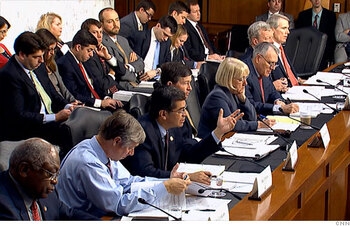The Kansas Social Studies Classroom-Based Assessment (CBA) is designed to measure student understanding of the five History, Government, and Social Studies (HGSS) standards and four associated benchmarks that support the discipline-specific application of content in authentic situations. The standards, benchmarks, and skills allow Kansas school districts, classroom teachers, and students the opportunity to develop their own assessment that best supports local decisions concerning content, sources, and products. To prepare learners for the state-level CBA, the KOHP has developed several compelling questions, frameworks, a multi-disciplinary crosswalk, and instructional activities for use by classroom teachers.
Standards Crosswalk Materials
Learning is all about making connections—from one subject to another, from classroom to everyday life. This set of "crosswalk" materials connects the social studies disciplines of history, geography and government with the standards for English Language Arts and Library and Information Literacy at the elementary, middle school and high school levels. In 2023 the English Language Arts Standards and Library and Information Literacy Standards were updated by the Kansas State Board of Education. The crosswalk materials are intended to help teachers incorporate the ELA and Library standards in the social studies classes as they utilize the foundational Show Morepractices of ELA: to write, speak, read and listen appropriately in all disciplines, to use knowledge gained from literacy experiences to solve problems or seek to understand diverse perspectives. Show Less




